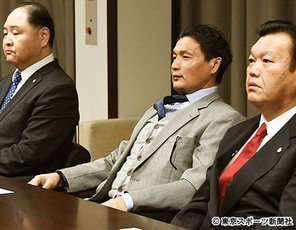 Source: news.headlines.auone.jp
Source: news.headlines.auone.jp On Thursday, Takanohana Koji, himself a former Yokozuna and director within the JSA, and in charge of the stable that oversaw Harumafuji, was booted off the board of directors and demoted two places for his apparent reluctance to report to the JSA on the incident involving Harumafuji. The board found that despite Takanohana’s admission that he went to the police to report on the incident soon after it occurred, his failure to inform the JSA board immediately after the event and his refusal to attend a meeting of the JSA crisis management panel until December 25 were grounds for removing Takanohana from his post.
As has been widely reported, it is the first time that the JSA executive has removed a director from its ranks, itself a fairly newsworthy event. However further details have come to light which reveal more details about Takanohana’s attitude towards the JSA board and why he behaved in the manner he did.
Takanohana was admitted to the JSA executive in 2014 by former JSA chairman Kitanoumi at the relatively young age of 41 (Takanohana, along with his brother Wakanohana, were revered as Yokozuna throughout the 90s and early 2000s). Kitanoumi made Takanohana general operations manager, which was a sign of the confidence he had in Takanohana’s abilities. However in November 2015 Kitanoumi suddenly died, thereby leaving a vacancy for the position of JSA chairman.
In March 2016 elections for the chairman’s position took place pitting Takanohana against another former Yokozuna, Hakkaku Nobuyoshi. Hakkaku won the election, and appointed Takanohana as the chief of the tourism department of the JSA, a position that effectively removed Takanohana from the executive. To add injury to insult, Hakkaku then appointed one of his own stable’s members, Oguruma Oyakata, to the position of managing director of the JSA, effectively making him Hakkaku’s deputy.
Takanohana appears to have something of an axe to grind against Hakkaku, and that might make its presence felt at the next chairman’s election. Takanohana has around 8 close allies on the board, and with another 10 supporters would have more than enough votes to clinch the top position in the organization. The main problem here, however, would be whether the existing executive would acknowledge the result of the election, given that they had previously removed Takanohana from his position for acting in contempt of their authority. If Takanohana was elected, and then proceeded to implement his own plan of reform, quite a few executives might object and seek to block Takanohana from exercising his authority.
So far, Takanohana has not spoken in public in relation to the controversy surrounding him, so his intentions are only known to a close circle of allies. It is highly likely that he will put himself forward as a candidate for chairman at the next election (scheduled for this year), if anything to ensure the prompt removal of Hakkaku from any position of authority. This, of course, will only perpetuate the degree of hostility between the two, and could split the JSA which would affect sumo operations and ultimately the public’s enjoyment of tournaments. Takanohana will accept his punishment for now, but he is biding his time, and the issue will flare up again either next month or in March when electoral matters bring it to a head.
 RSS Feed
RSS Feed